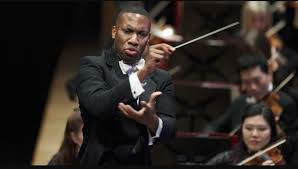The Dome, Sunday 26 May 2019
The Brighton Festival closing concert is by definition ‘The Big One’. But this was bigger.
The decision to perform Michael Tippett’s celebrated British wartime oratorio A Child of Our Time, with its subtly powerful pacifist’s outcry against racism, fascism, bigotry and xenophobia at such a febrile time in home and European politics, was potently relevant enough.
But then to cast the conductor and all four vocal soloists as not only non-British but three Afro-Americans and a Maori appears a decision of insightful brilliance. A deed far from daring or audacious and entirely logical as the final bequeathing to the Festival by its 2019 guest director Rokia Traoré from Mali, working with resident Australian Festival chief executive, Andrew Comben..
The Festival closer is never more spectacular than when the Brighton Festival Chorus are towering above the orchestra to create a wall of bodies, instruments and sound confronting the surrounding 1,700 seats of the Dome audience. And now, the focal figure directing these forces of 243 performers was the young, lean, 6ft-plus Roderick Cox, taking calm, graceful, composed command while adorning the podium with at once distinctive long legs, arms and directing fingers.
The potential of A Child of Our Time to move listeners musically was guaranteed the moment Tippett heard ‘Steal Away to Jesus’ and was instantly captured by the world’s favourite Spiritual. This black slave song and four others he recruited strategically as choruses expressing both neutrality and universality inside a musical framework moulded on successful Baroque oratorio models such as Messiah and the Bach Passions, but inflected occasionally within Tippett’s own sound world with afro and Latin rhythms.
The Brighton Festival Chorus revelled in the opportunity and unfailingly elevated the occasion. Jonathan Lemalu’s narration darkly told Tippett’s parable of hope for the world once again turning ‘on its dark side’.
Noah Stewart’s crystal words bit home as the scapegoat Child of Our Time, and Gweneth Ann Rand was the softly desolate mother with Ronnita Miller luminously steadfast as the Aunt.
The performance, which ends in an unexpected and counter-affirmative sudden minor chord, was greeted with huge warmth by the audience whose cheers had earlier been directed towards Trio Isimsiz after a Beethoven work that ended in a largely sunlit polka.
Isimsiz means ‘nameless’ in Turkish, the half-ancestry of Erdem Misirlioglu, their prizewinning pianist and their only member to have reached age 30 in a trio whose own prizewinning includes European triumph in Beethoven repertoire. Brighton’s own knowledgeable chamber-music-loving Coffee Concert public already rate and love them for their two charmingly accomplished performances in recent years at The Attenborough Centre.
After two intended performances that conspired not to materialise this was finally their first one of Beethoven’s pioneering, underrated and still under-performed Triple Concerto. And in less than ideal circumstances, on a bulging stage forcing a compromise playing layout whose challenges involved Misirlioglu having to play with his back to the others.
But Isimsiz succeeded, and one looks in coming years to tracking their growingly authoritative account of a work of authoritative material during the relatively few performance chances they will get.
Petrov and Pablo Hernán Benedi on violin were, as expected, in total alert accord in their melodic and passage work together, and the awaiting power was obvious when joined by the piano. Benedi has a subtle characteristic style, sometimes understated, sometimes delivering familiar passages seasoned with the freedom of a street fiddler and imparting that welcome sense of spontaneous newness.
Richard Amey

